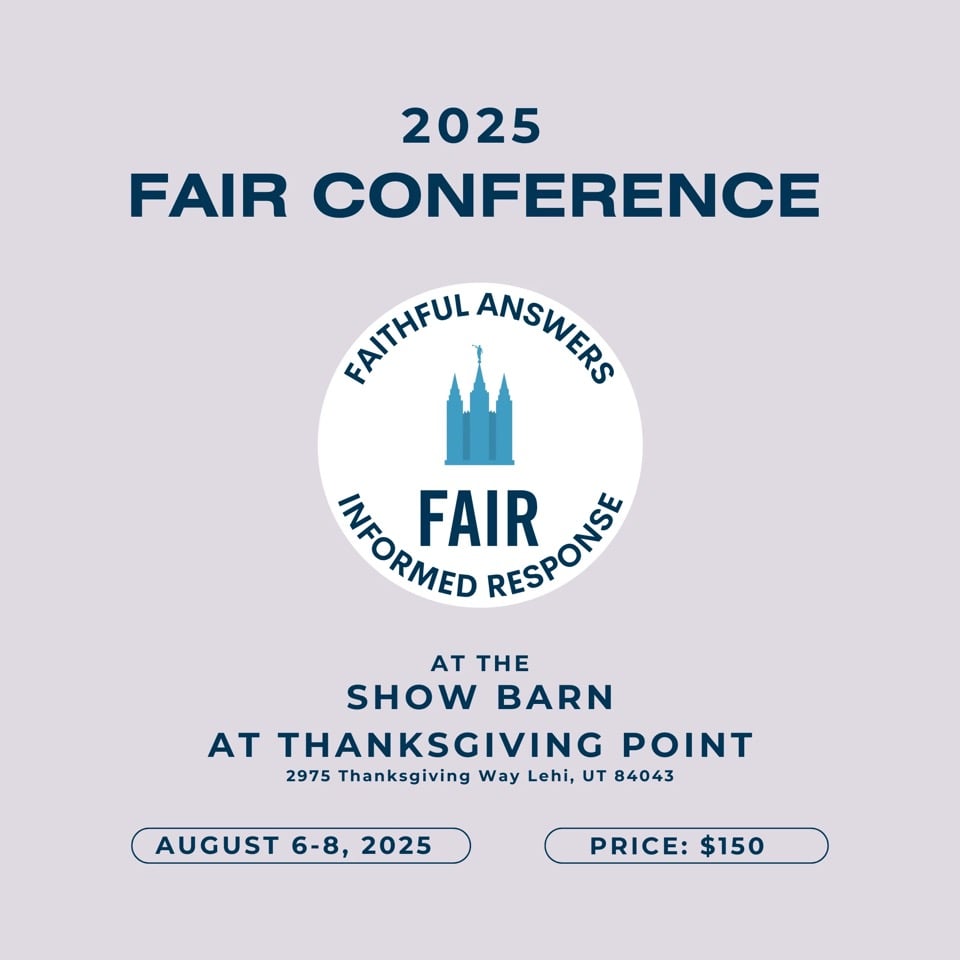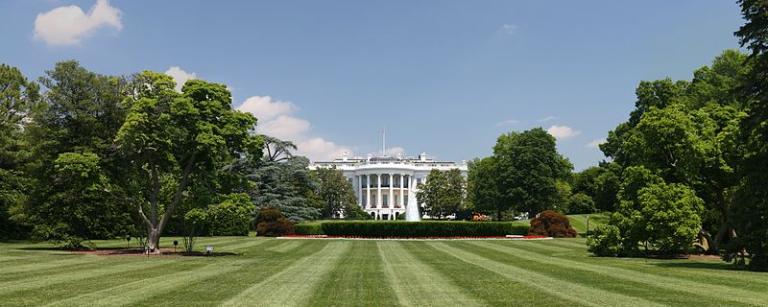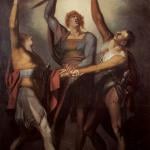
Details regarding the approaching 2025 FAIR conference can be found here. I hope to see you there, although it’s very likely that I won’t be speaking on the topic that’s currently listed for me online. I’m not even sure where that title came from. Did I suggest it? If I did, I don’t remember it.
I also hope to see you at this coming Saturday’s second (and last) day of the Interpreter Foundation symposium on “Abraham and His Family in Scripture, History, and Tradition.” I will be presenting there, although I must caution you that I genuinely don’t regard my paper as very interesting. By contrast, I spoke with my friend Jack Welch today about the presentation that he gave at the symposium last Saturday; I think that the argument he presented is absolutely intriguing.

A number of years ago, I was chatting with a member of the First Quorum of the Seventy (now long emeritus) about partisan politics and the Church of Jesus Christ of Latter-day Saints. (This member of the Seventy held a doctorate in political science from Harvard University and had had an impressive international academic career prior to his call to full-time ecclesiastical work.) He recalled a conversation with the late Michael Deaver, who had served for several years as deputy White House chief of staff under Ronald Reagan, in which Deaver thanked him for Latter-day Saint loyalty to the Republican Party. Feeling impish, Elder X responded that, actually, the majority of Latter-day Saints were probably socialists. Mr. Deaver was surprised and puzzled, so Elder X explained that most members of the Church now live outside of the United States and that, for example, most Venezuelan Saints were almost certainly Chavistas.
Mr. Deaver had forgotten — or, more likely, didn’t know — about the existence of Latter-day Saints beyond the borders of the United States of America. And so too, seemingly, do those who prattle confidently about how almost all members of the Church are absolutely in love with Donald Trump. It turns out, though, that most members of the Church aren’t Americans at all, let alone MAGA Republicans. For example, the first Latter-day Saint member of the British House of Commons was Terry Rooney, who was the Labour MP for Bradford North from 1990 to 2010. David Rutley, of the Conservative Party, served as the MP for Macclesfield from 2010 until 2024. Brian Adam, a biochemist, union activist, and member of the Scottish National Party, served as a member of the Scottish Parliament from 1999 until his premature death from cancer in 2013. Stephen Kerr was a Conservative member of the British Parliament from 2017 to 2019 and has been a member of the Scottish Parliament since 2021. There is variety among these four examples, but none of them seems to be (or to have been) a MAGA-style Trump Republican.
However, even claims that American members of the Church are exceptionally devoted to the person of Mr. Donald J. Trump don’t quite hold up to scrutiny. It is true, of course, that Latter-day Saints have tended strongly Republican through many presidential election cycles. In a 2016 article titled “U.S. religious groups and their political leanings,” published just before Donald Trump became the Republican presidential nominee for the first time, the Pew Research Center reported that
Mormons are the most heavily Republican-leaning religious group in the U.S. . . . Seven-in-ten U.S. Mormons identify with the Republican Party or say they lean toward the GOP, compared with 19% who identify as or lean Democratic – a difference of 51 percentage points. That’s the biggest gap in favor of the GOP out of 30 religious groups we analyzed, which include Protestant denominations, other religious groups and three categories of people who are religiously unaffiliated.
Later that year, months after publication of the Pew Research Center piece, Mr. Trump dominated Utah’s presidential caucus with a massive 14% of the Republican vote, eventually surging to a commanding 45.5% of Utah ballots in the state’s November presidential election. His performance in Utah’s 2016 general election represented the second worst Republican electoral performance out of the last fourteen presidential contests in the state, and his next two presidential runs represented the fourth and fifth worst. It’s very difficult to see those figures as illustrating an exceptional infatuation in Utah or among Latter-day Saints with Donald Trump.
According to exit polls released shortly after last year’s national election, high percentages of Latter-day Saints in Nevada, Arizona, and Utah did indeed vote for Mr. Trump. But the national exit polls are interesting:
According to Fox News’ 2024 election exit poll, among the Latter-day Saints surveyed 64% supported Trump and 32% supported Vice President Kamala Harris. . . .
The 2020 Fox News exit poll showed nationally 72% of Latter-day Saints supported Trump compared to 23% for former President Joe Biden.
The difference between a 72% pro-Trump vote in 2020 — pretty much on the mark for the “seven-in-ten U.S. Mormons [who] identify with the Republican Party or say they lean toward the GOP” mentioned in the 2016 article above — and the 64% pro-Trump vote four years later, in 2024, doesn’t argue strongly for any unusual and growing allegiance to Donald Trump among Latter-day Saints.
For purposes of comparison, an article from the Pew Research Center (“White evangelicals continue to stand out in their support for Trump”), dated 28 April 2025 — slightly more than a week ago — supplies the following figures:
- 72% approve of the way Trump is currently handling his job as president.
- 69% rate the ethics of top Trump administration officials as excellent or good.
- 57% say they trust what Trump says more than what previous presidents said.
And here is a recent article from the Deseret News (20 April 2025: “Here’s what Utah voters say about Trump’s job performance: Trump touted his achievements from his almost 100 days in office”):
Despite being a red state, Utah is divided on Trump’s job performance. A slight majority, 54%, said they somewhat or strongly approve of what Trump has done so far, and 42% disapprove, while 5% said they don’t know.
By now, I suppose that it won’t surprise anybody who follows this blog that I regard an approval rating of 54% as much higher than Donald Trump deserves. But 54% certainly doesn’t indicate a massive and exceptional Latter-day Saint enthusiasm for Mr. Trump, let along a growing enthrallment with him — and especially not when that figure is compared with, say, his current rate of approval among American Evangelical Protestants.
One final point: There is, it seems to me, a significant difference between someone who is enraptured with Mr. Trump in particular and a habitual Republican voter of more or less conservative inclinations who opted for Mr. Trump (a) because Mr. Trump was the Republican nominee and (b) because that voter regarded Hillary Clinton and/or Joe Biden and/or Kamala Harris as flatly unpalatable. I know a few genuine Trump enthusiasts. I know many more people, though, who simply oppose the current Democratic Party, which they associate with transgender athletes, defunding the police, overregulation, urban anarchy, and a host of other positions that they deem beyond the pale. The former are MAGA Republicans. The latter are just Republicans, or conservatives.
And while we’re at it, here’s a piece by Yonat Shimron at the Religion News Service: “These women are giving their legislators a piece of their mind — one quilt square at a time: Mormon Women for Ethical Government and its allies have assembled 57 quilts to present to members of Congress on Wednesday.”

Finally, it’s time for yet another depressing entry from the Christopher Hitchens Memorial “How Religion Poisons Everything” File™. This one, originally from U.S. News & World Report, comes from the subsection of the Hitchens File that is affectionately known among connoisseurs of horror as “Utah is Hell on Earth, Thanks to the Mormons”: “Politics, Religion and Why Utah Is (Again) the Best State in America: Utah shines in hard-data areas like the economy and education – but don’t overlook its more intangible traits.”











